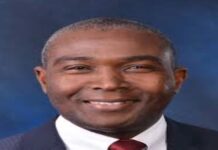*Emir of Kano backs govt on liberalisation of oil sector
The federal government yesterday admitted that Nigeria was still very far from reaping the full benefits of its enormous gas resources, compared to even African countries with far less reserves, but which earn more than Nigeria’s $5 billion annually.
Speaking at the 6th Valuechain Annual Lecture and Awards in Abuja, Vice President Kashim Shettima, noted that Nigeria remains an ‘ocean of gas and a drop of oil’, with over 200 TCF of untapped gas resources and ranking 9th globally in terms of proven reserves.
The theme of the event was: “Midstream Gas Development: A Pathway to Energy Transition.” Shettima was represented by the Special Adviser to the President on Energy and Power Infrastructure, Office of the Vice President, Sodiq Wanka.
Stressing that the impact of fully exploiting the nation’s gas reserves would be massive, the vice president explained that gas remains critical to the nation’s power supply, accounting for over 80 per cent of total generation.
Describing gas as a critical transition fuel for the country’s ambitious climate targets of hitting net-zero by 2060, the vice president said growing Nigeria’s production would enhance other gas-based industries, from fertiliser methanol to cement and consumer goods.
A booming economy built on the exploitation of gas reserves, he maintained ,can vastly enhance the fiscal position of the federation.
“But the story of Nigeria’s gas riches and potential cannot be complete without understanding that we are far off from that potential and have a lot of work to do, as public sector leaders and as captains of industry.
“Today, Nigeria earns around $5 billion from gas production, a figure that is 40 per cent less than in Egypt, which has around 30 per cent of Nigeria’s reserves. Our production to reserve ratio is less than a 3rd of Egypt’s, less than a quarter of Algeria’s and around 10 per cent of Malaysia’s,” he pointed out.
In the aftermath of the Russia-Ukraine war, Shettima said the the European Union (EU) and many other nations were shopping for Liquefied Petroleum Gas (LNG), lamenting that at the same time, Nigeria’s largest LNG assets were operating significantly below capacity because gas supply was inadequate.
“At this rate, according to ‘Decade of Gas’ analysis, we could have a demand-supply gap of up to 10bscfd of gas by 2030,” he added.
On how gas can impact the economy, the vice president highlighted the number of power plants and factories that have built up around the Escravos-Lagos-Pipeline system and its various spurs.
He expressed happiness that the AKK pipeline was nearing completion, which will unlock gas demand along the Northern corridor, but noted that there was still a lot of work left to be done.
“The Obigbo-Umuahia-Ajaokuta pipeline will be key to ensuring the AKK pipeline is not gas-constrained while opening up new demand along its right of way. There is much work left on expanding the ELPS network among others.
“These projects can be significantly accelerated if we focus on making investments in them more attractive. Our network code must adequately cover private pipelines.
“ We have to ensure that private investors are able to recover their costs and make a return on their investments by creating a new framework for tariffs that is not too rigid. And we need to have clear guidelines for tolling. The story is similar for other midstream infrastructure,” he stressed.
On what the government is doing to solve the challenges, he explained that Nigeria cannot talk about midstream infrastructure in isolation, with the power sector remaining the largest consumer of domestic gas.
“ The government is working actively to resolve longstanding liquidity issues in the sector. Some of the most ambitious customer metering initiatives are underway or soon to be announced.
“We will continue to strengthen sector governance that favours only technically and financially sound investors to own key assets in the power sector. We will drive the implementation of the Electricity Act 2023 to create a new narrative and new national framework for electricity that will bring investment to the electricity sector.
“In terms of upstream gas, the commitment of the government on ensuring the right tariffs to encourage exploitation of non-associated gas remains strong. The government will also not rest in continuing to pursue a holistic approach to the issue of security of petroleum assets – from strengthening the operationalisation of the Host Communities Trust Fund to closer community engagement, surveillance and prosecution of identified vandals,” he noted.
Shettima urged the private sector to be at the forefront of realising the country’s economic potential, stressing that Nigeria cannot be a net exporter of LPG and still import LPG for domestic use because of infrastructure gaps.
In his remarks, His Royal Highness, Emir Of Kano, Dr Aminu Ado Bayero, who is the Chairman of the Editorial Advisory Council of Valuechain, while commending the federal government for spearheading the promulgation of the Petroleum Industry Act (PIA), said it will enable higher prospects for foreign and local investments in the sector.
“Within the prevailing opportunities that the transition offers, I wish to identify with the likely benefits for growth of enterprises, particularly small businesses that may now be encouraged to thrive with enabling incentives for the prosperity of our people and our communities.
“ I am particularly delighted to convey the enthusiasm of the good people of Kano, about the Ajaokuta-Kaduna-Kano (AKK) natural gas pipeline project, running through communities, states and cultures while harnessing economic linkages along the corridor.
“It is equally noteworthy and commendable that the federal government has, through the PIA, mustered the political will to liberalise the petroleum industry for fair participation and harmonious relations between the players, regulators and host communities,” he added.
Earlier, the Publisher, Chief Executive of Valuechain Media Group, Bashir Usman, said the vision of the group was to offer the energy industry a ‘special voice’ for discussing the challenges that plague the industry.
“To achieve our energy goals as a nation, we must consciously invest in infrastructure that facilitates the smooth transition of gas production from the upstream value chain to the downstream end.
“This noble task is not one that can be accomplished in isolation. It requires determination from the government, which should provide the necessary policies and funding to make such investments attractive to both local and international stakeholders,” he stated.























